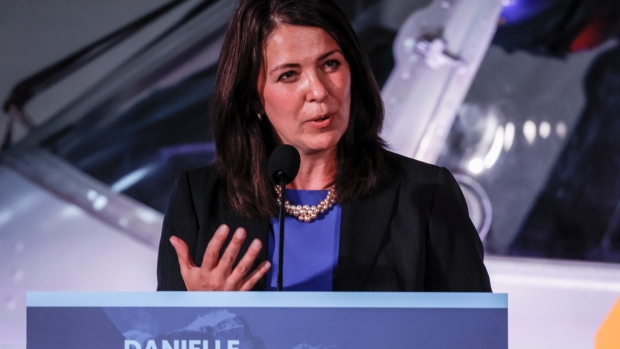Alberta’s re-elect leader Danielle Smith has put herself on a collision course with Prime Minister Justin Trudeau over climate policies that would weigh on the province’s fossil fuel industry.

Smith, leader of the United Conservative Party (UCP), defeated New Democratic Party leader Rachel Notley on Monday, and immediately targeted Trudeau, threatening the country’s ambitious climate goals.
Smith warned Trudeau’s Liberal climate policies will destroy tens of thousands of jobs in the oil and gas sector, which contributes more than 20% to Alberta GDP.
Some analysts have said deep emissions cuts are not possible without reducing oil production, which Smith fiercely opposes.
In her victory speech in front of cheering supporters in Canada’s oil capital Calgary, Smith called on Albertans to stand up against policies including the federal government’s proposed oil and gas emissions cap and clean electricity regulations, expected to be unveiled within weeks.
“Hopefully the prime minister and his caucus are watching tonight,” Smith said. “As premier I cannot under any circumstances allow these contemplated federal policies to be inflicted upon Albertans.”
Canada has the world’s third-largest oil reserves, most of which are held in northern Alberta’s vast oil sands. The province produces around 80% of Canada’s 4.9 million barrels per day of crude oil.
“Let’s keep working together to deliver results for Albertans – let’s create more good jobs, grow our economy, and continue to position Alberta as a leader in clean energy,” Trudeau said in a tweet on Tuesday, as he congratulated Smith on her victory.
“Alberta is obviously heavily invested in a future that involves the oil and gas economy,” said Darrell Bricker, CEO of pollster Ipsos Public Affairs. “This is going to be a bone of contention” with Ottawa, he added.
‘BELLICOSE RHETORIC’
Since becoming premier in October, Smith passed legislation allowing the province to refuse to enforce federal laws it deems unconstitutional, and she has threatened to use it on legislation seen as a potential threat to the province’s energy industry.
Smith and Trudeau have also sparred over who should pay for potential increases to tax credits for carbon capture and storage (CCS) projects that the oil and gas wants to use to decarbonize its production process.
However, some industry leaders seeking public sector funding for CCS are tiring of the combative relationship between the two levels of government and have called for better collaboration.
Earlier this year, Alex Pourbaix, the then-CEO of oil producer Cenovus Energy, said he would “like to see the temperature turned down a little bit.”
For Trudeau, Smith may be a better political counterpoint than her less controversial rival Notley would have been, Bricker said, as the Liberals can cast her as a western version of federal Conservative leader Pierre Poilievre.
That said, provincial leaders of all political stripes tend to work with the federal government when it is beneficial to their electorate, as has been the case recently with federal funding for healthcare and childcare.
“Danielle Smith is canny enough to know that she has to be able to work with Ottawa,” said Shachi Kurl, president of pollster Angus Reid Institute.




